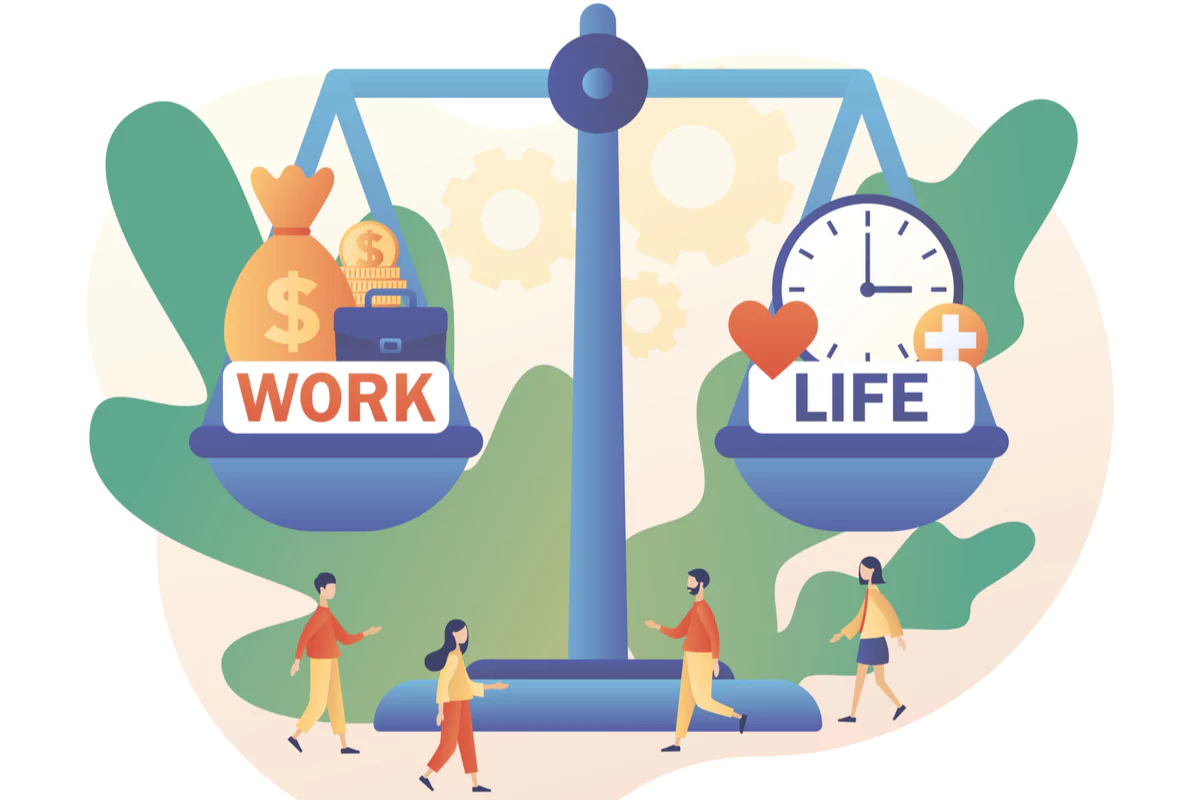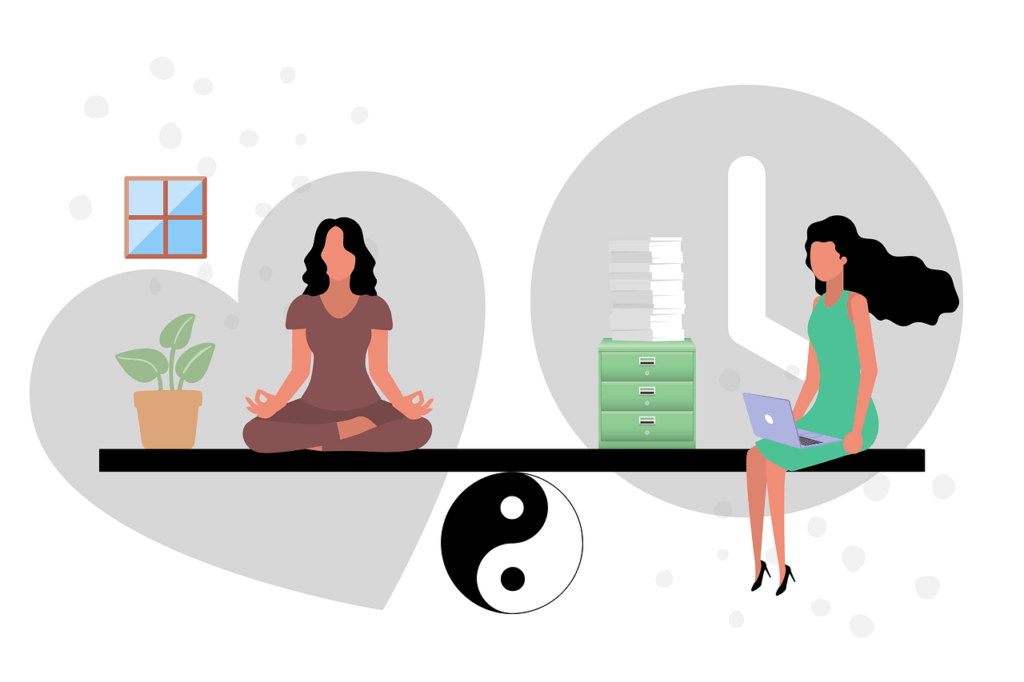
Work life balance: What it is and ways to improve yours
Imagine a life brimming with both professional success and personal fulfillment. You leave work feeling energized, eager to connect with loved ones or pursue your passions. But the reality for many is a constant tug-of-war between work demands and personal desires. This is where the elusive concept of work life balance comes into play.

Why need work life balance?
Here’s a breakdown of why achieving a work life balance is crucial for your overall well-being:
Work life balance for Reduced Stress and Improved Mental Health:
- Constant Workload: Working long hours and neglecting personal time can lead to chronic stress and burnout. A healthy work life balance allows you to recharge and come back to work feeling refreshed and focused.
- Improved Mood: When you have time for activities you enjoy and to relax, it reduces stress hormones and uplifts your mood. This can lead to increased feelings of happiness and overall well-being.
- Reduced Risk of Burnout: Chronic stress and overwork can lead to burnout, a state of emotional, physical, and mental exhaustion. Work life balance helps prevent burnout by allowing you to detach from work pressures.

Enhanced Physical Health:
- Healthy Habits: Making time for exercise, healthy meals, and proper sleep becomes easier with a work life balance. This promotes overall physical health and reduces the risk of chronic diseases.
- Stronger Immune System: Chronic stress weakens the immune system, making you more susceptible to illness. Work life balance helps manage stress, leading to a stronger immune system and fewer sick days.
- Improved Sleep: Lack of work life balance can disrupt sleep patterns. With dedicated relaxation time, you can ensure quality sleep, crucial for physical and mental rejuvenation.
Increased Productivity and Work Performance:
- Improved Focus: Feeling rested and less stressed allows you to focus better at work. You can approach tasks with more clarity and efficiency.
- Enhanced Creativity: Disconnecting from work allows your mind to relax and explore new ideas. This can lead to increased creativity and problem-solving abilities when you return to work.
- Motivation and Determination: A healthy work life balance prevents burnout and fosters a sense of motivation and determination. You’ll approach work with renewed energy and enthusiasm.
Improved Personal Relationships:
- Quality Time with Loved Ones: Work life balance allows you to dedicate time to family, friends, and romantic partners. This strengthens relationships and fosters a sense of connection.
- Reduced Stress Spillover: Work stress can negatively impact your personal life. A balanced approach keeps work stress in check, promoting healthier interactions with loved ones.
- Personal Growth: Having time for hobbies, interests, and self-care activities promotes personal growth and a sense of fulfillment outside of work.
Overall Life Satisfaction for Work Life balance:
- Work-Life Harmony: A healthy balance creates a sense of harmony between your professional and personal spheres. You feel fulfilled in both aspects, leading to greater life satisfaction.
- Reduced Work-Life Conflict: Constant work demands can lead to conflict with personal obligations. Work life balance minimizes such conflicts, promoting a sense of peace and well-being.
- Sense of Control: Achieving a work life balance empowers you to take control of your time and priorities. This fosters a sense of agency and satisfaction with your overall life.
In conclusion, work-life balance is not just about dividing your time between work and personal life. It’s about creating a sustainable and fulfilling lifestyle that promotes your physical, mental, and emotional well-being. By prioritizing both work and personal time, you invest in your overall happiness and success.
How to cultivate work life balance?

Achieving work life balance is an ongoing journey, but here are some key strategies to create a more balanced and fulfilling life:
Set Boundaries and Manage Time Effectively:
- Create a Schedule: Develop a realistic schedule that allocates time for work, personal obligations, relaxation, and sleep. Stick to it as much as possible.
- Learn to Say No: Don’t be afraid to politely decline extra work or commitments when you’re already stretched thin. Prioritize tasks and delegate when possible.
- Set Communication Boundaries: Establish clear expectations for work email and phone calls outside of regular working hours. Disconnect during personal time.
- Utilize Technology: Leverage technology like time management apps or calendars to organize your schedule and tasks.
Prioritize Self-Care and Well-being:
- Schedule Relaxation Time: Block out time for activities you enjoy, whether it’s reading, exercising, spending time with loved ones, or pursuing hobbies.
- Maintain a Healthy Lifestyle: Prioritize healthy eating, regular exercise, and adequate sleep. These habits contribute to better physical and mental health, allowing you to manage stress effectively.
- Practice Mindfulness: Activities like meditation, yoga, or spending time in nature can help reduce stress and promote relaxation.
Optimize Your Work Environment:
- Talk to Your Employer: If your workload is overwhelming, have an open conversation with your manager about workload distribution or delegation options.
- Create a Productive Workspace: Designate a workspace at home or the office that is organized and free from distractions.
- Take Breaks Throughout the Day: Get up and move around, step outside for fresh air, or take short breaks to clear your head and prevent burnout.
Maintain Strong Personal Relationships for Work life balance:
- Schedule Time for Loved Ones: Dedicate quality time for family and friends, even if it’s just a shared meal or a quick phone call.
- Communicate with Your Partner: If you live with a partner, discuss household responsibilities and work schedules to ensure both of you have time for personal pursuits.
- Maintain Social Connections: Nurturing friendships and social networks provides support, reduces stress, and offers a sense of belonging.
Remember, achieving work-life balance is a continuous process. Be kind to yourself, and adjust your approach as needed. Here are some additional tips:
- Be Flexible: Unexpected situations arise. Be prepared to adjust your schedule, but don’t let occasional disruptions derail your overall balance.
- Focus on Quality over Quantity: When spending time with loved ones, focus on creating meaningful connections rather than just ticking boxes.
- Delegate and Ask for Help: Don’t be afraid to delegate tasks at work or home. Asking for help is not a sign of weakness but a sign of self-awareness.
- Reward Yourself: Celebrate your achievements, both big and small. Taking time to acknowledge your progress helps maintain motivation.
By implementing these strategies and prioritizing both work and personal well-being, you can cultivate a work life balance that fosters happiness, success, and a sense of fulfillment in all aspects of your life.
See also:
